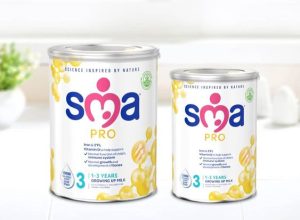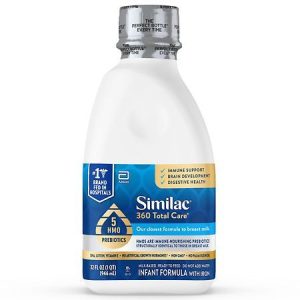There are many choices to be made when it comes to raising a child. One decision parents face is how to feed their baby. Are formula-fed babies less intelligent? Breastfeeding is the natural way to nourish an infant, but formula feeding is a safe and healthy alternative for many families.
A common concern among parents considering formula is the misconception that formula-fed babies are less intelligent than breastfed babies. This article explores the research on this topic and provides information to help parents make informed decisions.
Focus on What Matters: A Child’s Overall Well-Being
There is no single factor that determines a child’s intelligence. Genetics, environment, and access to quality nutrition all play a role in a child’s cognitive development.
The most important thing for parents to focus on is providing a loving and nurturing environment that supports their child’s overall well-being. This includes a balanced diet, regular sleep, and plenty of opportunities for play and learning.
Research on Breastfeeding and Intelligence
Some studies have suggested a link between breastfeeding and slightly higher scores on cognitive tests in children. However, these studies are often observational, meaning they can’t prove that breastfeeding directly causes higher intelligence.
There may be other factors at play. For example, mothers who choose to breastfeed may also be more likely to engage in other behaviors that promote cognitive development, such as reading to their children or talking to them more frequently.

Formula Safety and Nutrition
Modern infant formula is carefully designed to meet the nutritional needs of a growing baby. It contains essential vitamins, minerals, and protein to support healthy development, including brain development.
If a parent is unable to breastfeed or chooses not to breastfeed, formula feeding can be a safe and healthy way to nourish their child.
The Importance of Informed Decisions
There are many benefits to breastfeeding, but it’s not always possible or the right choice for every family. Factors such as a mother’s health, lifestyle, and personal preferences can all influence this decision.
The best choice for feeding a baby is the one that works best for the family. Parents should talk to their doctor or pediatrician to get information about both breastfeeding and formula feeding. This will help them make an informed decision that is right for their baby.
Additional Resources for Parents
Here are some resources that parents may find helpful:
- The American Academy of Pediatrics: https://publications.aap.org/pediatrics/article/150/1/e2022057988/188347/Policy-Statement-Breastfeeding-and-the-Use-of
- The Centers for Disease Control and Prevention: https://www.cdc.gov/breastfeeding/features/breastfeeding-benefits.html
- La Leche League International: https://llli.org/
- The Infant Feeding Action Coalition: https://infactusa.org/
The decision of how to feed a baby is a personal one. There is no right or wrong answer, and both breastfeeding and formula feeding can provide the nutrients a baby needs to thrive.
Focus on what matters most: your child’s overall health and well-being. Ensure they receive proper nutrition, have a loving environment, and get plenty of opportunities to learn and grow.

The Importance of Balanced Nutrition for All Babies
Let’s refocus on the most important thing: all babies, breastfed or formula-fed, have the potential to be intelligent and thrive.
Modern formula is specifically designed to provide the nutrients a growing baby needs for healthy development, including brain development. Here are some key nutrients in formula:
DHA:
An omega-3 fatty acid important for brain development.
Iron:
Essential for cognitive function.
Choline:
Plays a role in memory and learning.
Breastmilk also contains these important nutrients, along with other beneficial factors like antibodies that can help protect a baby from illness.
Ultimately, the best choice for feeding a baby is the one that works best for the family.
Focus on What Matters: Nurturing Potential in All Babies
The science is clear: there’s no evidence that formula feeding directly leads to lower intelligence. Many factors contribute to a child’s cognitive development, and a loving, supportive environment plays a huge role.
Here are some ways to nurture your child’s potential regardless of feeding method:
-
Interaction and Play: Engage your baby in conversation, sing songs, read stories, and provide plenty of opportunities for exploration through safe play.
-
Healthy Habits: Ensure a balanced diet rich in fruits, vegetables, and whole grains. Regular sleep is also crucial for brain development.
-
Positive Reinforcement: Celebrate your child’s milestones and achievements, big or small. This fosters a sense of confidence and encourages them to keep learning.
Remember, every child develops at their own pace. If you have any concerns about your child’s development, talk to their doctor. They can provide personalized advice and ensure your child is on the right track.

All Babies Deserve the Best Start
The question of intelligence isn’t the most important factor when it comes to feeding a baby. Every baby, fed with breast milk or formula, has the potential to be healthy and happy.
Here’s why:
- Both breast milk and formula provide essential nutrients to help babies grow and develop.
- The most important thing is to feed your baby in a way that works for you and your family.
Let’s focus on creating a loving and stimulating environment where your baby can thrive. Here are some ways to do that:
- Spend lots of time talking, singing, and playing with your baby.
- Provide opportunities for safe exploration and discovery.
- Maintain a consistent routine for sleep and meals.
If you have questions about feeding your baby, talk to your doctor or a registered dietitian. They can help you make informed choices based on your baby’s individual needs.

Formula and Breastfeeding: Different Choices, Same Love
The way you feed your baby is a personal decision. There are many factors to consider, but intelligence isn’t one of them.
Both breast milk and formula provide the nutrients a baby needs to grow and develop. Here’s what really matters:
- A loving and supportive environment: This is crucial for a child’s overall well-being and development.
- Healthy habits: A balanced diet, regular sleep, and plenty of playtime are essential for all babies.
- Open communication with your doctor: They can answer your questions and address any concerns you may have about your baby’s development.
Remember, every milestone is a cause for celebration! Be your baby’s biggest cheerleader and focus on their individual journey. If you have any questions about your baby’s development, talk to your doctor. They can provide personalized advice and resources to support you and your baby.

